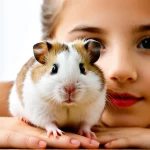Defining the Ideal Companion: Traits of Popular UK Pets
Understanding the UK pets qualities that make some animals favored in British homes helps clarify why certain species thrive as companions. Among the most popular pets UK-wide, dogs, cats, and rabbits feature prominently, each bringing distinct attributes that appeal to diverse lifestyles.
British pet temperament often emphasizes affectionate nature, adaptability, and sociability. Dogs commonly exhibit loyalty and protectiveness, making them excellent family pets that bond closely with owners. Cats, on the other hand, tend to be independent yet affectionate, enjoying both companionship and personal space. Rabbits combine curiosity with a gentle disposition, ideal for households seeking a quieter pet experience.
Also read : What are the benefits of having a pet hamster for children?
Popularity of pets UK-wide is influenced by cultural factors: smaller living spaces encourage preference for cats and smaller dog breeds, while rural areas might favor dogs with active energy levels. These preferences contribute to defining what pet qualities British owners value most—companionship, manageable care requirements, and suitability to home environments.
Embracing these traits helps potential pet owners select companions that fit both their lifestyle and cultural context, ensuring lasting bonds grounded in understanding and mutual enjoyment.
Also to discover : How Do Pets in the UK Adapt to Urban Living Environments?
Building Bonds: How UK Pets Form Strong Connections with Owners
Understanding the pet-owner bond in the UK is key to appreciating the deep connections pets share with their owners. UK pets often establish trust through consistent interaction, gentle care, and routine. This bond goes beyond basic companionship; it shapes the emotional well-being of both pets and owners.
Loyalty is a standout feature in UK pet relationships. Pets display unwavering affection by responding to their owner’s voice, following them around, or seeking comfort during stressful times. This loyalty fosters a sense of security and happiness, which many UK pet owners describe as mutually enriching.
Animal behaviour experts emphasize that clear communication and positive reinforcement strengthen these bonds over time. Dogs and cats, the predominant UK pets, exhibit unique ways of demonstrating loyalty—from a dog’s wagging tail to a cat’s slow blink, each gesture carries meaning.
For UK pet owners, this relationship is often described as a partnership built on respect and care, leading to lasting loyalty and affection. These connections are essential in creating a nurturing and joyful environment, highlighting why the pet-owner bond in the UK remains profoundly strong.
Cultural and Societal Factors Influencing UK Pet Companionship
The UK pet culture is deeply embedded in everyday life, reflecting the nation’s affectionate relationship with animals. Pets in the UK often transcend the role of companions, becoming family members. This cultural perspective shapes how British society views pet care, companionship, and responsibility.
British attitudes toward pets reveal a strong emphasis on animal welfare, with many viewing pets as sources of comfort and emotional support. This empathetic approach fosters widespread community acceptance of pet ownership, encouraging inclusion of animals in social settings.
The UK’s pet-friendly society further exemplifies this cultural bond. Public parks, cafes, and even workplaces increasingly accommodate animals, promoting environments where pet owners feel welcome. Such pet-friendly policies enhance quality of life for both pets and their owners, reinforcing societal support systems for animal companionship.
In effect, these cultural and societal factors combine to create an ecosystem that values pets highly. Understanding these influences helps explain why pet ownership in the UK remains popular and continuously supported by community and legislative efforts, ensuring pets thrive as integral parts of society.
Standards of Care: Ensuring Well-Being for UK Pets
Maintaining high animal welfare standards UK is a cornerstone of responsible pet ownership UK. The UK enforces stringent regulations that protect pets and ensure their well-being, emphasizing proper veterinary care and nutrition. Veterinary professionals follow established protocols that prioritize preventive health measures, timely vaccinations, and treatment of illnesses, reflecting the nation’s commitment to quality pet care.
Alongside veterinary excellence, nutritional practices play a vital role. Owners are encouraged to provide balanced diets tailored to their pet’s specific needs, promoting longevity and vitality. The availability of specialized pet foods reflects the UK pet care market’s focus on health-conscious choices.
Adoption trends in the UK also highlight a shift toward responsible pet ownership UK. Shelters and rescue organizations collaborate with authorities to promote ethical adoption processes, ensuring pets find suitable, loving homes. This focus on responsible ownership aligns with educational campaigns that inform the public about pet welfare and the importance of commitment over convenience.
Together, these standards create a framework that supports the health, happiness, and ethical treatment of pets—demonstrating the UK’s dedication to safeguarding its animal companions through comprehensive care and responsible practices.
Real Stories: Why UK Pets Are Cherished Companions
In the UK, countless pets are more than just animals; they are emotional support animals and beloved family members. Real stories from UK pet owners reveal profound bonds that highlight the benefits of UK pets on mental and physical health. For example, many have shared how their dogs and cats provided comfort during challenging times, including periods of isolation or stress.
One UK pet owner recounted how their rescued dog helped reduce loneliness and anxiety, acting as a consistent source of comfort. Such narratives underscore the invaluable role of pets as emotional support animals in the UK, helping owners regain a sense of normalcy and joy.
Beyond emotional anecdotes, statistics demonstrate that owning UK pets correlates with lower stress levels and improved overall well-being. Experts nationwide endorse the companionship of pets, noting increases in social interaction and physical activity often resulting from pet ownership. These benefits of UK pets extend well beyond the home, contributing positively to communities and individual health.
By embracing these real-life experiences and expert insights, the profound impact of UK pets as cherished companions becomes clear, highlighting their essential role in emotional support and everyday happiness.
How Robot Hoovers Navigate Your Home
Understanding how robot hoovers move around your space reveals their true efficiency. These devices use a mix of sensors and cameras to map and navigate your home accurately. When you ask, “How do robot hoovers know where to clean?” they reply through sophisticated technology that continuously scans your environment.
Most models employ infrared sensors, which detect obstacles and prevent collisions. Some advanced options include LiDAR or visual mapping, creating real-time floor plans. This allows precise navigation, avoiding redundancies and ensuring every corner is covered without missing spots.
Robot hoovers often learn the layout over multiple cleaning cycles, adjusting their paths for optimal coverage. They can distinguish between floor types, like carpet or hardwood, adapting suction power accordingly.
By integrating this technology, a robot hoover not only cleans efficiently but reduces the need for manual intervention. This makes it a practical choice for busy individuals seeking effortless home cleaning solutions. Understanding these features helps you select a model that matches your preferences.

